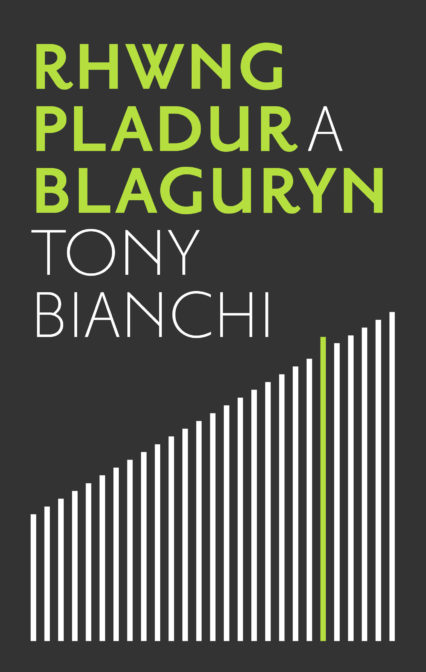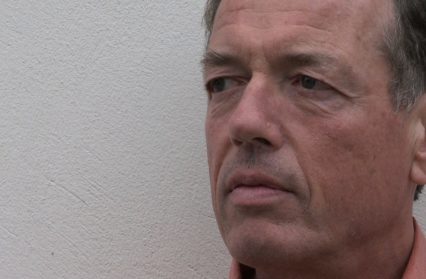Jim Parc Nest remembers novelist and poet Tony Bianchi, a year after his death, and ahead of the posthumous publication of his last poems, Rhwng Pladur A Blaguryn.
Tony Bianchi: novelist, poet, critic, raconteur, short story writer, musician, and the winner of the Daniel Owen Memorial Prize 2007 and The Prose Medal 2015. He mastered the art of cynghanedd and won many prestigious awards for writing an englyn, a thirty syllable four lined rhyming stanza which is one of the main traditional measures of cynghanedd. A few months prior to his untimely death, he entered two free verse poems in the Môn National Eisteddfod, 2017 Crown competition; both were placed among the best of 34 poems.
Tony came to Wales as an immigrant from the region known as The Old North comprising of parts of Southern Scotland and Northern England from Din Eidyn (Edinburgh) to Catraeth (Catterick) where an early form of Welsh was spoken and used by poets such as Aneirin and Taliesin. Aneirin’s famous poem Y Gododdin (c. 600) tells the epic story of Welsh warriors being vanquished by Saxons in the bloody battle of Catraeth.
At the beginning of June 2017, having heard the sad news of his terminal illness, I was invited by Tony and his partner, Ruth, to their home to discuss publishing his one and only collection of poetry. Having been given a copy in advance, and his command of Welsh being so correct, I had only a few minor points to suggest. I will never forget the courage shown by both during those difficult hours. I was reminded of Pozzo’s words in Waiting For Godot, Samuel Beckett, concerning the state of humanity: ‘They give birth astride a grave, the light gleams an instant, then it’s night once more’. Throughout my visit, the light shone constantly; the night was never mentioned. With the exception of one phone call, there was no further exchange between us. My call was to ask his permission to write this foreword. The typical reply of the humble genius in his best Lampeter Welsh accent was that the collection didn’t deserve such pampering.

Tony was born on April 4, 1952 in North Shields, Northumberland. One of the unexpected events of his life, which multiplied eventually into many surprising outcomes, was his becoming a student, in 1969, at Lampeter College, one that wasn’t highly regarded at that time in the league of colleges. It appears that he had poor examination results mainly due to the fact that his teachers had persuaded him to sit the exams a year earlier than expected. Also it is possible that he was hindered by domestic problems, especially his father’s cruelty which is so honestly documented in the poem ‘Dianc’ (Escape).
The next unexpected step was to take an Ulpan course to learn Welsh, even before graduating with a double first in English and Philosophy. He then won his doctorate with a thesis on the influence of the Gemini myth on the shorter works of Samuel Beckett. His decision to learn Welsh illustrated his resolve to be part of the strong national reaction to the series of insults Wales had suffered during the 1960s: the drowning of the Tryweryn Valley (1965) against the will of the majority of the Welsh nation, the Aberfan disaster (1966) followed by the inhuman misuse of donations, originally collected for the benefit of grieving families, being stolen to fund the clearing of coal tips, and the Investiture (1969) of an alien Prince of Wales.
Before leaving the Lampeter period it is worth noting the early influences on the career of the English student from North Shields, who very quickly acquired, in colloquial Welsh, the fluency of a native Cardi. Stan Laurel, one of the famous comedy film actors of the twentieth century, went to live to North Shields when he was five years old, and retained a connection with the town throughout the rest of his life. Having worked with Charlie Chaplin for a while, he then joined with Oliver Hardy to produce their particular style of slapstick. Tony was an ardent fan. He kept a photograph of the duo on his desk, proud of his connection with the sad looking little man who was a giant in the world of comedy. In Lampeter, Tony was introduced to the work of Jacob Davies, Alltyblaca, a raconteur and an expert teller of tall stories. Like Laurel, his comedy also had traits of tragedy and absurdity. When one adds the work of the tragi-comic dramatist Samuel Beckett to the mix, one has the perfect ingredient to produce the recent Bianchian avid readership.
After a period of teaching in Shotton and a fellowship lectureship in the English department of the University College of Wales at Aberystwyth, Tony joined the literature department of the Arts Council of Wales, eventually becoming its head. His experience of working in that institution inspired his first novel Esgyrn Bach ( Y Lolfa 2006) which is a scathing satire on obsessive bureaucracy. The ‘Bach’ of the title was Tony’s favourite composer. His music would flow from his grand piano in his study, especially during Tony’s struggle with recovering from a bout of depression which burdened him from time to time.
Tony had experienced obsessive behaviour during his childhood. In the poem ‘Cartref’ (Home) he depicts his mother’s obsession with cleanliness and general housekeeping. Her obsessiveness finally reduces her to the futility of looking in vain for a hole in a stocking, and eventually a hole anywhere in the house.
Many of Tony’s main characters in his novels are obsessive: Steffan, the statistician in Esgyrn Bach; Jim, the entomologist in Pryfeta; Byron, the estate agent in Chwilio am Sebastian Pierce; Harri, in Ras Olaf Harri Selwyn and Tomos, the laundry worker in Dwy Farwolaeth Endaf Rowlands.
As well as becoming a Fellow of the Academi, his work was nominated on the short list of the Welsh Book of The Year 2008, and long lists of 2007, 2011 and 2013. And he won the prize for an eight piece micro literature composition at the Môn Eisteddfod 2017. Probably this is the very last prose he wrote. In the eighth piece, Huw, a carpenter, goes on the internet to look for a second hand van. The author displays his typical research thoroughness by listing different kinds of vans, Ford Transit Connect, Escort 75, Vauxhall Combo, noting their various superiorities, and this by an author who didn’t own a car and used his bicycle more often than not. Following that minor irony comes the stunning irony of the story’s conclusion. Having chosen the van, Huw imagines ‘ throwing his tool bag in the back, sitting in the driver’s seat, and closing the van door. He feels his fingers starting the engine, he releases the brake, engages the gear, presses the throttle and goes to . . . goes to . . .’ Remembering the probability that Tony, while writing these very last words, was beginning to become conscious of the threat of his terminal illness, the inconclusive ending is so heavy with stark and dark irony.
Tony won many prestigious prizes for his poetry. This collection gives us an opportunity to regard him as an accomplished poet both in cynghanedd and free verse. The running order of the poems is his choice.
The opening cywydd ‘Llythyr at yr awdur’ is a satirical and self deprecating take on the bureaucracy of an Arts Council of Wales official dealing with authors’ grants, the bureaucracy which Tony himself would be at its mercy after becoming a free lance writer. It is followed by a remarkable section of 48 englynion. The influence of Bach’s music has already been mentioned. This anecdote by his partner, Ruth, is illuminating: ‘He would often call me into his study to listen to a particular phrase, or even a single chord, and wonder at the mind that was capable of combining the individual notes in such an original and astonishing manner. He loved the exquisite construction of Bach’s longer works, the mathematical precision, every single note perfectly placed with nothing extraneous, nothing missing.
Sublime in every sense of the word. This is what he was aiming for in his poetry, especially in his englynion’. Tony was enthralled by the similarity between creating a musical chord and creating a line of cynghanedd. His englyn sings with the precision and artistry of a Bach sonata. Consistent with the versatility and the astuteness of his creativity, this collection shows, along with the intensity of solemn and dark emotions, the playful humour that entertained his friends, his family and his readers. But it was not only through the medium of words that Tony expressed his principles on behalf of justice and peace. He supported the movement for nuclear disarmament, and was a prominent member of The Wales Anti-Apartheid Movement. Having been persuaded that he had a good baritone voice he established, with another four, Côr y Cochion, the singing group that took part in various protests. And despite his questioning atheism Tony would often be seen in a cymanfa ganu (a hymn singing festival) in his Hawaiian flowered shirt amongst the sober funereal attire.
Tony died on Sunday 2 July 2017, at his home in Pontcanna on the other side of the hedge of Tafwyl, the annual Cardiff Welsh language music and poetry festival. It was a very sad experience to hear the sombre reactions of so many when the news broke on the festival field. But a different spirit guided the unconventional ceremony on the meadows of Coed-ar-hyd-glyn. His brave family chose to lead us to celebrate the life of the dearest of talents with smiles of flowers and happy anecdotes.
The Englishman, who was so proud of the illustrious literature of his own nation, was inspired by the richness of the Welsh literary tradition. As an immigrant from The Old North, he understood and admired the significance of the longevity and tenacity of that Welsh tradition despite the tension engendered by the ‘Catraeth’ battles of the centuries. His remarkable contribution was to enrich that tradition with his genius and unique imagination.
Rhwng Pladur A Blagury by Toni Bianchi is out now from, Barddas.












